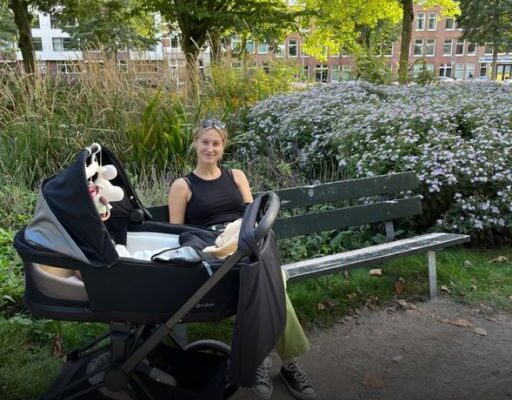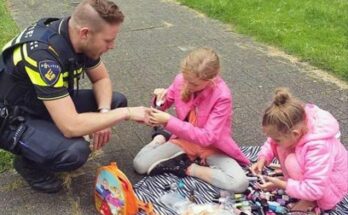I was sitting on a bench under the big oak tree at Maple Park, holding my daughter close while feeding her from a bottle. It was one of the first sunny days we’d had in weeks, and I just wanted to enjoy it—her little fingers wrapped around mine, birds chirping, the breeze warm on my face. The kind of quiet moment I had fantasized about during so many sleepless nights.
We were finally settling into a rhythm, my little girl and me. She was eight weeks old, soft as a cloud and just as fleeting in her expressions. I was still getting used to calling myself “Mom.” The word felt strange in my mouth, like a dress that hadn’t quite been tailored to fit yet. But it would, eventually.
That’s when she approached.
A woman, maybe mid-forties, walked up with the kind of confidence you only get from believing the universe gave you a badge. She had a linen sling diagonally across her chest, a baby tucked inside like royalty. She tilted her head at me, lips pressed together like she’d just tasted something sour.
“You know breast is best, right?” she said. No hello. Just that.
I blinked. “Excuse me?”
She gestured toward the bottle in my hand like it was filled with antifreeze. “You really should try harder. Formula’s just not the same. Poor baby.”
Poor baby.
My chest tightened. That phrase—it always cut deep. Like I was robbing my daughter of something she deserved. I took a deep breath and stood up, cradling my daughter more tightly.
“You want to know something?” My voice wavered, but I didn’t stop. “I spent six years trying to get pregnant. Six years of hormone shots, surgeries, miscarriages, and crying alone in bathroom stalls after every failed test.”
Her eyes widened slightly, but I wasn’t about to give her a chance to speak.
“I finally accepted that my body couldn’t do it. We adopted. Two years of paperwork, interviews, background checks, and waiting by the phone. And one day, we got the call.”
I could feel people around us starting to listen in—moms near the swings, a dad by the sandbox.
“I didn’t give birth to her. I didn’t breastfeed her. But she is mine. Every sleepless night, every bottle, every diaper, every lullaby—I earned this. So don’t you dare look at me like I’m less of a mother.”
Silence. Then, a slow clap from the dad near the sandbox. One of the moms by the swings joined in. Then another. And another.
The woman turned a deep shade of red. She opened her mouth like she was about to say something else, but then her baby fussed, and she took that as her cue to back away, disappearing down the path.
I sat back down, still shaking a little, and kissed the top of my daughter’s head. “You’re perfect,” I whispered.
A young woman approached me a few minutes later, holding a toddler by the hand.
“Thank you for saying that,” she said softly. “I bottle-fed both of mine. The judgment never really stops.”
We talked for a while—her name was Marissa—and we made plans to meet again next week at the same spot. It felt good, not being alone.
But that wasn’t the end of it.
Later that afternoon, I shared the story in a local parenting forum—not for praise, just to vent. The post exploded. Hundreds of comments, private messages from mothers who had gone through the same thing. Breastfeeding moms. Formula-feeding moms. Adoptive moms. Single moms. Moms with postpartum depression. So many of us just… trying to do our best.
One message in particular stood out. It was from someone named Lianne, who wrote, “I was that woman once. Judgmental, self-righteous, convinced there was only one way to be a ‘good mom.’ Then my second baby had a medical condition that made breastfeeding impossible, and suddenly, I was the one being judged. I’m sorry for what she said to you. I hope she finds her wake-up call too.”
It stuck with me. We’re all just one life twist away from being humbled.
About a week later, I went back to Maple Park. Same oak tree. Same bottle. My daughter’s eyes had started tracking birds in the sky, her lashes long like fans. That’s when I saw her again—the woman with the sling.
But this time, she didn’t approach. She sat on a bench across the path, her baby no longer in the sling but in a stroller. She kept sneaking glances my way, and finally, after about twenty minutes, she walked over.
“I owe you an apology,” she said quietly. “I was out of line last week.”
I looked at her, surprised. She looked tired. Not just new-mom tired, but soul tired. I nodded for her to sit.
We talked. Her name was Janet. Her husband had left her during her second trimester. Her mother, who lived across the country, criticized everything she did. She had been trying to breastfeed through pain, exhaustion, and self-doubt, clinging to it because it was the only thing that made her feel like she was doing something “right.”
I listened. And I told her what I’d learned: no one gets a gold star for how they feed their baby. The prize is a healthy, loved child. The real win is surviving, day by day, with your heart still open.
She cried. I did too. We exchanged numbers. And just like that, a critic became a friend.
Three months later, we started a local group called Moms Without Manuals. Just a bunch of imperfect women, showing up every Tuesday at the park with our babies and our stories. Breastfed, bottle-fed, adopted, biological, sleep-trained, co-slept—it didn’t matter. We just made space for each other.
That one awful encounter bloomed into something beautiful. And now, whenever I see a mom sitting alone with a bottle or struggling with a stroller or wiping tears off her baby’s cheeks with her sleeve, I smile. I ask her how she’s doing. Because I know how much that simple kindness can mean.
So yeah—someone once looked at me like I was less of a mother.
Now I get to look at other moms and remind them they are more than enough.
If you’ve ever been judged for how you parent, you’re not alone. Share this if you’ve ever had to stand up for yourself, or better yet—if someone stood up for you when you needed it most.
Let’s clap for that. 👏



